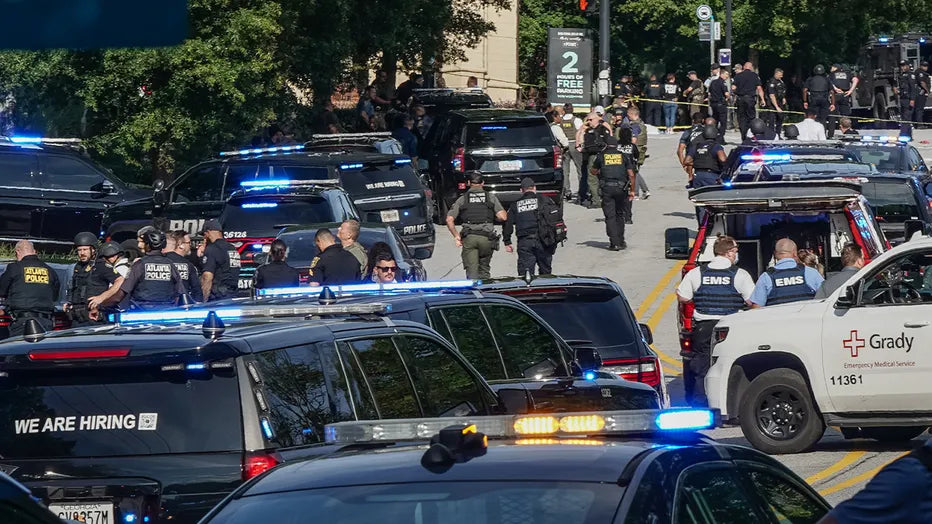On August 8, 2025, a devastating shooting near the Centers for Disease Control and Prevention (CDC) headquarters in Atlanta, Georgia, claimed the life of a DeKalb County police officer, injured another, and left a community reeling. The gunman, whose identity remains undisclosed, is believed to have targeted the CDC because he attributed his illness to the COVID-19 vaccine.
After discussions with his family, police confirmed that the shooter either suffered from a genuine medical condition or firmly believed he did, blaming the vaccine for his plight. This conviction appears to have been the driving force behind his violent act, which saw gunfire strike at least four CDC buildings.
While this act of violence is utterly indefensible, it sheds light on the serious side effects caused by the COVID-19 vaccine, the legal immunity protecting vaccine manufacturers, and the government’s failure to support those harmed.
The Incident: A Deadly Attack on the CDC
The shooting erupted around 4:50 p.m. on August 8, 2025, near the CDC’s Roybal Campus and Emory University, prompting a “RUN, HIDE, FIGHT” alert. Atlanta Police Chief Darin Schierbaum reported that the suspect, described as a white male, fired multiple rounds, some aimed at law enforcement and others likely targeting CDC buildings, where four bullet holes were found.
The shooter was discovered deceased on the second floor of a building housing a CVS Pharmacy, with the cause of death—self-inflicted or police-related—still under investigation. DeKalb County officer David Rose, a 33-year-old father of two with a third child on the way, was killed. Another officer was wounded, and four civilians sought medical care for stress and anxiety. No CDC staff were physically harmed.
According to CNN, citing a law enforcement source, the shooter’s family revealed that he believed the COVID-19 vaccine caused his illness. This belief, whether based on a diagnosed condition or a perceived one, fueled his attack on the CDC, the institution central to the vaccine’s rollout. Atlanta Mayor Andre Dickens described the suspect as a “known person” with specific “interests,” though further details await the Georgia Bureau of Investigation’s probe. The incident underscores a tragic intersection of personal suffering and distrust in public health systems.
Violence Is Not the Answer
The loss of Officer David Rose and the trauma inflicted on the community highlight a fundamental truth: violence is never a justified or effective response to personal or societal grievances. The shooter’s actions caused irreparable harm, killing a dedicated public servant and endangering countless others. While his belief that the vaccine caused his illness may reflect broader frustrations, resorting to violence only deepens pain and obscures legitimate concerns.
Grievances about vaccine injuries should be addressed through peaceful advocacy, legal channels, or public discourse—not through acts of destruction that leave families and communities shattered. The Atlanta shooting serves as a grim reminder that violence solves nothing and only compounds tragedy.
Vaccine Side Effects: Documented and Devastating
The shooter’s conviction that the COVID-19 vaccine caused his illness aligns with documented evidence of serious side effects linked to the vaccine. An international study of 99 million people, published in Vaccine in February 2024, confirmed that the COVID-19 vaccines, particularly the mRNA-based Pfizer-BioNTech and Moderna vaccines and the Johnson & Johnson adenovirus vaccine, have caused rare but severe adverse effects in some individuals. These side effects include:
-Myocarditis and Pericarditis: The mRNA vaccines have caused inflammation of the heart muscle (myocarditis) and its lining (pericarditis), particularly in young males aged 12–39 after the second dose. A 2021 CDC analysis reported approximately 13 cases per million in this group, with symptoms including chest pain, shortness of breath, and palpitations. These conditions can lead to long-term heart damage in some cases.
-Arrhythmia and Cardiac Arrest: The vaccines have been linked to irregular heartbeats (arrhythmia) and, in rare instances, cardiac arrest, often as complications of myocarditis. While direct causation of cardiac arrest is less common, the vaccine’s impact on heart tissue can precipitate life-threatening events.
-Guillain-Barré Syndrome (GBS): The Johnson & Johnson vaccine has caused GBS, a neurological disorder leading to muscle weakness and, in severe cases, paralysis. The CDC reported an additional 15.5 GBS cases per million doses, primarily in men over 50, prompting restrictions on the vaccine’s use.
-Facial Paralysis (Bell’s Palsy): The mRNA vaccines have caused temporary facial paralysis in some recipients. While often reversible, these cases have alarmed affected individuals and fueled distrust.
These side effects, though rare, have had profound impacts on those affected, contributing to a growing sense of betrayal among some who trusted the vaccines. The shooter’s belief that the vaccine caused his illness reflects the real experiences of individuals who have suffered these adverse effects, which, while statistically uncommon, are life-altering for those impacted.
The 1986 National Childhood Vaccine Injury Act and Manufacturer Immunity
A major source of anger for those harmed by the COVID-19 vaccine is the civil immunity granted to vaccine manufacturers, rooted in the National Childhood Vaccine Injury Act (NCVIA) of 1986. Signed by President Ronald Reagan, the NCVIA was enacted to shield manufacturers from lawsuits that threatened to halt vaccine production.
It established the National Vaccine Injury Compensation Program (NVICP), a no-fault system funded by a vaccine excise tax, to compensate individuals for injuries from vaccines like those for measles or polio. However, COVID-19 vaccine injuries fall under the Countermeasures Injury Compensation Program (CICP), a post-9/11 program for emergency countermeasures.
The CICP has been widely criticized for its inefficacy. As of 2024, it has compensated only 15 claims for less than $60,000, none for GBS, and its high burden of proof leaves many claimants without recourse. Critics, including advocacy groups like React19, argue that this immunity is unconstitutional, violating the right to seek redress for harm, a principle enshrined in the U.S. Constitution. Lawsuits challenging the CICP’s framework claim it denies due process, yet pharmaceutical companies insist that immunity is essential for rapid vaccine development during crises. This legal protection has left many vaccine-injured individuals feeling abandoned, with no clear path to justice.
Government Inaction and Public Distrust
The government’s failure to address vaccine-related injuries has deepened public distrust. Advocacy groups like React19 estimate that thousands of Americans have suffered serious side effects from COVID-19 vaccines, yet many feel dismissed by health authorities. The Vaccine Injury Compensation Modernization Act, which would transfer COVID-19 vaccine claims to the NVICP, has stalled in Congress amid political divides. Democrats fear that acknowledging side effects could fuel anti-vaccine sentiment, while Republicans resist funding compensation programs. This inaction has left individuals like Anthony Flint, who developed GBS after the J&J vaccine, feeling ignored, as reported in a 2024 *Harvard Public Health* article.
The Atlanta shooter’s actions, while reprehensible, may reflect the desperation of those who feel harmed by the vaccine and unheard by the system. The government’s reluctance to provide robust compensation or acknowledge the vaccine’s role in causing rare but serious side effects has exacerbated distrust, contributing to the conditions that led to this tragedy.









Share:
Trump’s Demand to Exclude Illegal Aliens from the Census: Constitutional, Cultural, and Controversial
Congress Urges Treasury Secretary Scott Bessent to Investigate Ireland’s Boycott of Israel